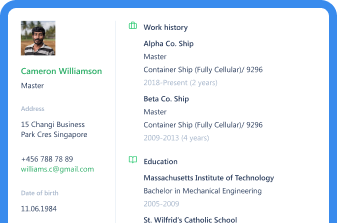How to Read Candidate Body Language in Maritime Recruitment
Jan 20, 2020 · 19 mins read ·
Maritime Recruitment
Whether you’re a shipowner or manager, or one of the shipping industry’s maritime recruitment agencies, chances are you send out a lot of email invitations for interviews and see a lot of different candidates when you’re recruiting for your jobs at sea.
And that means you see lots of different characters. But how can you tell who’s going to be the right seafarer for the job?
The very nature of maritime jobs means that your candidates will probably hail from all over the world. It’s likely that you come into contact with any number of different personalities on any given week in the office.
Which means that you need to be careful about reading the person and the situation and base your decision to hire accordingly.
Of course, that’s not to say that just because two applicants for your jobs at sea appear to be very similar or come from the same country they will behave in the same way - we’re all different after all. But there are ways you can get a glimpse into an individual’s suitability for your seafarer jobs.
And one of those ways is through body language.
How to read candidate body language in maritime recruitment
The important thing to remember is that interviews are not a natural situation. It’s probably fair to say that not many people actively enjoy them - especially candidates!
Read more: 5 Tips for Clear Communication in the Maritime Industry
Plus it’s easy to forget that while you’re completely at home in your office, for anyone coming for an interview it’s a new environment - and possibly an intimidating one too. Particularly in maritime recruitment where your applicants will probably be more at home on a ship than sat at a desk.

And an interview is almost always a far bigger deal for the applicant than it is for you as a maritime recruitment agency or shipowner.
Read more: 5 Tips for Better Maritime Recruitment Interviews
You’ve sent out your phone or interview invitation email and the applicant was pleased to be considered for the position but nerves may well have now taken over.
These nerves can be increased in maritime recruitment too if a seafarer and/or the interviewer are speaking in a language that isn’t their native tongue.
At the other end of the scale you might come across candidates who are interviewing for your vacancies who come across as extremely confident - to the point of being boastful or downright annoying.
This could also be a sign of nerves; different people express themselves in different ways.
The point is, it can be easy to misread certain signals or mannerisms - especially in interviews.
By knowing how to pick up on non-verbal cues that express nervousness, you reduce the chances of rejecting a candidate who was actually perfect for the position, just a little shy when you first met them.
By reading body language, you’ll be able to cut through the bluster of a seemingly overly confident candidate and remind yourself that someone who is coming across as timid or awkward may not be anything like that in real life.

Remember: their body language and the way someone acts in an interview situation is not necessarily a representation of their true personality.
Tips for reading seafarer candidates' body language
Whether you’re an employer or one of the maritime recruitment agencies, your seafarer might be nervous. There are some signs to look out for so you can dismiss certain body languages as nerves without jumping to unfair conclusions about a person.
However, equally important is to trust your own instincts and look out for any warning signs that you might actually need to pick up on before signing off on that contract.
1. Overly enthusiastic or overly friendly candidates
Of course, no one is going to be impressed by an unenthusiastic, sullen, or unfriendly candidate but appearing overly keen can be a sign of nerves. The seafarer wants to impress you so that they can get their next contract signed and find new a new seafarer job.
As they settle into the interview, the candidate should become a little less over the top and calmer.
Body language: Signs of over enthusiasm or friendliness could be smiling or grinning more than is necessary, or talking too quickly and too much. They may compliment you and come across as insincere.
Warning sign: If they don’t start acting a little more naturally and instead remain extremely friendly and eager right the way through the meeting, this is not usually normal interview behavior.
They might be trying to hide something so do your due diligence and double check their seafarer documents and certificates are all in order, ensure they are who they say they are, and that there are no issues with alcohol in their work history.

2. Inattentive or distracted candidates
A candidate for your jobs at sea might appear a little absent minded when they first sit down, and that’s not really too much to worry about providing they become focused after a few minutes of talking. This could be attributed to nerves or tension due to being in an unfamiliar environment.
If their attention seems to waver towards the end of the interview, this is likely to be a sign that they’ve lost interest in the position - or perhaps that they’ve just been sitting down for too long!
Body language: Looking around the room, tapping the desk, rocking backwards on the chair, crossing and uncrossing the arms or legs, and general fidgeting.
Warning sign: If the above signs persist throughout the interview, you should be on red alert. This could be an indication that your seafarer has a substance abuse problem. It could be drugs (illegal or prescription) or it could be alcohol.
Either way you need to get to the root of the issue.
3. Suddenly disinterested candidates
If your candidate has suddenly gone from interested and alert to disengaged it could be that they’ve either lost interest in the position for whatever reason, or you have inadvertently offended them in some way.
It’s unlikely they’ll say anything to you directly or get up and walk out of the room, but you can usually spot it when you’ve potentially lost an interviewee as they’ll be displaying physical signs of discomfort or disinterest.
Body language: Stretching (to indicate they see the interview as finished), eye rolling, frowning, or crossing the arms as a means of creating a barrier with you.

Warning sign: Any of the above examples of body language can be treated as a fairly clear sign that even if you wanted to line that candidate up for one of your vacancies for seafarers, they might not be as on board with that decision as you are and they may continue to apply for other maritime jobs.
Don’t place too much importance on body language
If you’re over-thinking candidates’ body language in your interviews you could be missing out on finding some top talent for your jobs at sea.
By learning what certain traits of nervousness look like, hopefully you’ll be in a better position to figure out if the applicant might actually be a good fit for your vessel. Especially if their maritime resume looked good and they have the right qualifications and documents.
Read more: Assessing Candidates’ Soft Skills in Maritime Recruitment
For example, you’ve probably heard time and time again that if someone has a weak handshake, they’re a weak person or have a weak personality.
Of course this isn’t necessarily true.
Consider the fact that a candidate might well be nervous and have sweaty palms. Wouldn’t we all try and skip the hearty handshake if this was us in that situation?!

Trust your gut instinct in maritime recruitment
As someone employed by maritime recruitment agencies or shipping companies, or working in HR you probably have a fairly reliable ‘sixth sense’ when it comes to interviewing people to add to your seafarer database and fill your jobs at sea.
It’s worth remembering that reading body language is not an exact science - as humans we’re all unique by default! However it’s a fairly good indicator of who a person is and what they will bring to a position.
Read more: How to Identify a Red Flag Candidate in an Interview
Just remember not to take it all at face value over the course of an interview and while extreme body language such as the warning signs above are useful in weeding out potentially problematic candidates, it’s not wise to base your decision on whether or not to hire someone on body language alone.
Martide finds great candidates for your vacancies
Martide has a global pool of licensed seafarers who are either contracted to one of our prestigious clients, or ready and waiting to start new maritime jobs.
You’ll be able to search for candidates in our seafarer database by their skills and suitability for each of your vacancies for seafarers, and you’ll also be able to manage your entire maritime recruitment process through our platform too.
From job advertising to applicant tracking to interview management and evaluations and offers, Martide is with you every step of the way.
We’re one of the industry’s most trusted maritime recruitment software providers, so get in touch with us and schedule your free demo today.

Eve Church
Eve is Martide's content writer, publishing regular posts on everything from our maritime recruitment and crew planning software to life at sea. Eve has been writing professionally for more than two decades, crafting everything from SEO-focused blog posts and website landing pages to magazine articles and corporate whitepapers.
UK



